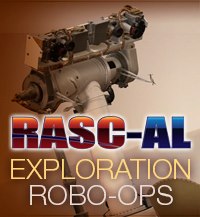COMPETITION OVERVIEW
RASC-AL Exploration Robo-Ops Competition (i.e., Robo-Ops) is an engineering competition sponsored by NASA and organized by the National Institute of Aerospace. In this exciting competition, undergraduate and graduate students are invited to create a multi-disciplinary team to build a planetary rover prototype and demonstrate its capabilities to perform a series of competitive tasks in field tests at the NASA Johnson Space Center’s Rock Yard.
At the RASC-AL Robo-Ops Competition in Houston, the rovers will compete on a planetary analog environment under the supervision of NASA judges. Up to three members of the team (plus the faculty advisor) will travel to JSC for the on-site testing. The remaining team members will stay behind at the local university to conduct Mission Control tasks. The prototype rovers will be tele-operated by the university team and must negotiate a series of obstacles while accomplishing a variety of tasks. Sample tasks include: negotiating specified up slopes and down slopes, traversing sand and gravel pits, picking up specific rock samples and placing them on the rover for the remainder of the course, and driving over rocks of specified diameter.
Each rover will be required to be controlled from the home university campus via a commercial broadband wireless up link. The only information available to the rover controller to perform the required tasks will be information transmitted through on-board rover video camera(s) or other on-board sensors. Cameras will allow the transmission of the competition back to the home universities as well as the general public.
Competition Website: RASC-AL ROBO-OPS
At the RASC-AL Robo-Ops Competition in Houston, the rovers will compete on a planetary analog environment under the supervision of NASA judges. Up to three members of the team (plus the faculty advisor) will travel to JSC for the on-site testing. The remaining team members will stay behind at the local university to conduct Mission Control tasks. The prototype rovers will be tele-operated by the university team and must negotiate a series of obstacles while accomplishing a variety of tasks. Sample tasks include: negotiating specified up slopes and down slopes, traversing sand and gravel pits, picking up specific rock samples and placing them on the rover for the remainder of the course, and driving over rocks of specified diameter.
Each rover will be required to be controlled from the home university campus via a commercial broadband wireless up link. The only information available to the rover controller to perform the required tasks will be information transmitted through on-board rover video camera(s) or other on-board sensors. Cameras will allow the transmission of the competition back to the home universities as well as the general public.
Competition Website: RASC-AL ROBO-OPS

